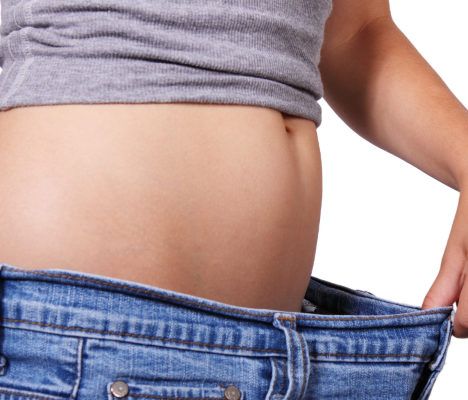
Menopause Belly Happens – But it is NOT Mandatory
Aug 11, 2021Yes, those unforeseeable years of menopause! It is a natural part of our life cycle and better to embrace it with grace than try to run away from it…because it happens to all of us
Accepting menopause as another stage in our growth, help us to be better prepared for the symptoms. Night sweats, hot flashes, mood swings, and tiredness are all common symptoms associated with menopause along with midsection weight gain – also called menopause belly. Menopause Belly and the other common symptoms are just that...common – But it is NOT Mandatory to experience or suffer with them!
Menopause is one day. It is the day that marks 12 consecutive months without a period. The 6-10 years leading up to menopause is called Perimenopause and once you have celebrated your no period anniversary, you are considered post-menopausal.
The transition can be seamless for some and a major struggle for others. There are no indicators for how it will feel for you, but one thing we can all do is take charge and become our own best health advocates BEFORE we reach menopause. Knowledge is power and gives us tools to seek out the best options for managing the transition.
One great resource is Menopause Chicks. I had the pleasure of joining as one of the 12 co-authors and health advocates of the book Moody Bitch to Menopause Chick. You can listen to my story on how I became the Vagina Coach, read about a case study and learn from the other amazing co-authors who are all experts in midlife wellness.
Shirley Weir of the Menopause Chicks does a remarkable Ted Talk.
Accepting menopause, as another stage in our life cycle, helps us to be better prepared for the symptoms. Along with the hot flashes, brain fog, mood swings, vaginal dryness and tiredness, our metabolism slows down.
If your new go-to wardrobe is stretchy pants (not just for yoga) here’s what’s happening with your body. Weight, and how it is distributed on your body, changes in menopause, and those added pounds can land right around your belly.
Your levels of estrogen begin to drop as your body starts to produce less in the perimenopausal stage. This can create some difficulty in reducing the extra pounds. Especially around your middle.
How does Menopausal belly happen and where does it come from?
Top of the list is STRESS – Perimenopause is often when the weight gain begins and it often correlates to the load we carry in life. Working full time, aging parents, kids at home, relationships…maybe even a pandemic? There is a lot to worry about and worrying is stressful. The life load and worries also contribute to:
- Too much or too little exercise. Many will push exercise to the bottom of the list while others are desperate to lose weight and end up over-exercising…which raises cortisol…which contributes to weight gain around the middle. Oh, and stress produces cortisol as well….
- Lack of sleep is in and of itself stressful and it also impacts our hunger hormones, ghrelin and leptin. We may make poor food choices such as processed and high glycemic index carbohydrates which turn rapidly to sugar. Choosing high-quality, whole, fresh foods most of the time will serve you well and keep you pooping well too!
- Imbalanced hormones – During perimenopause the hormones are usually in. a bit of flux whereby the ratio between estrogen and progesterone is off. Remember Cortisol? Well, it can contribute to hormone imbalance and it also affects your blood sugar and insulin. Having a comprehensive hormone test like the DUTCH test is a great option to learn more about what is happening in your own body.
Movement and Exercise
Menopause belly fat loss requires strength and endurance exercises that are high intensity but short duration. Deep breathing, interval-based cardio, and core work are all beneficial.
Lowering your stress level is as necessary as performing core exercise for reducing belly fat. Good belly laughs, doing activities that bring you joy are also good ways of reducing stress. Less strenuous movement such as walking, riding your bike on a beautiful trail or swimming can release neurochemicals that make you feel more at ease and less stressed. Pilates is good for strengthening muscles and toning up the body and of course, yoga…the benefits are endless.
Exercise should be done based on your body and if you have not exercised in years, start slowly with a daily walk and a set of squats. Exercise doesn’t have to be fancy to be effective, nor does it need to last hours. Working together with a physical therapist and/or core confidence trainer can help ensure you are exercising in ways that support weight loss, maintains bone density and increases muscle mass. As you increase your movement and exercise you begin to decrease your menopausal belly.

The Core, Pelvic Floor and The Core Breath
The core function is directly tied to the breath, and the breath to posture and alignment. When your alignment is off or you have poor posture, the breath is not optimized and the function of your core is hindered.
Pelvic Floor Dysfunction is an important health concern for most midlife women. As estrogen decreases the tissues and muscles in the pelvis start to narrow and thin while also becoming drier. Moisturizing your vagina is essential and for many, local vaginal estrogen can be a life changer! Speak to your health care provider about local vaginal estrogen therapy.
The Core Breath is my starting point when training the core. The breath works all of the inner core, establishing or re-establishing the synergy you desire in your foundation.
Once you master the core breath, you add movement so you can work the core as it should be worked – with movement.
The bridge, a seated march on the ball, squats, and lunges, are all exercises better done with the core breath. It is an excellent way to get all of the inner core synchronized. And let’s not forget reducing the Menopausal Belly!
Our Kegel and pelvic floor exercise programs have been designed from the ground up to provide you with strength in everything you do. Our pelvic floor programs will build core confidence.
More Resources:
Other Programs:
The 28-Day Challenge and Buff Muff Membership
I recommend checking out my comprehensive pelvic health education and fitness programs on my Buff Muff App. The most complete Pelvic Floor & Kegel exercise App to strengthen the pelvic floor.
The Buff Muff 28-Day Challenge (housed in the App) gets you started, and the Annual membership keeps you progressing so you can laugh, run, jump, and lift without the pesky leaks and annoying discomfort of prolapse symptoms.




